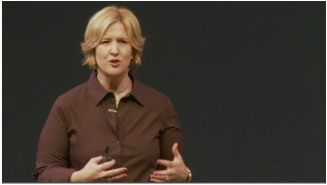 Brené Brown discusses qualitative research methods. Brené Brown discusses qualitative research methods. Tags: emotion/desire, methodology/statistics, qualitative research, vulnerability, 11 to 20 mins Year: 2010 Length: 20:20 Access: TED Talks Summary: A “researcher storyteller,” Brené Brown colorfully discusses her experience as a qualitative researcher in this TED Talk. Brown explores the personal and professional journey she's undertaken as a qualitative social science researcher, explaining her revelation that “stories are data with a soul.” Self-depreciating at times, Brown humorously and powerfully outlines her changing research perspective from “if you can’t measure it, it doesn’t exist” to becoming comfortable “lean[ing] into the discomfort of the work.” Specifically, Brown talks about her research on shame and vulnerability, in which she drew upon such methods as interviews, focus groups, and content analysis, accumulating “thousands of pieces of data.” Her methodological choices stemmed directly from her research query, which required her to understand how people give purpose and meaning to their lives. In her discussion, Brown brilliantly displays the vulnerability of doing qualitative work, as the “researcher storyteller” can easily become professionally and personally affected by her findings. I show Brown’s TED Talk to a few different sociology classes, including Introduction to Research Methods, Introduction to Sociology, and Contemporary Social Problems for three reasons. First, Brown’s presentation demonstrates to undergraduates the potential for qualitative methodologies to be fun, creative, non-linear, and profound. Second, the clip shows how social science research can measure—using qualitative methods such as interviews, focus groups, and content analysis—ostensibly tricky “variables” such as wholeheartedness and love. After showing the talk, I have the class discuss “variables” that they are now inspired to sociologically research, via qualitative methods. Finally, Brown validates the potential for social scientists to experience vulnerability when conducting qualitative research; this experience can potentially lead researchers to use their work toward remedying the social problems they study by connecting to their subject matter on an empathetic level. Submitted By: Beverly M. Pratt
2 Comments
Graciela Cortes
1/23/2017 06:02:13 am
It will help me to illustrate diverse issues in teaching qualitative reserach, Great!
Reply
Manuel Franco
7/29/2023 02:30:42 am
I just want to say Thank You to everyone who supported me through the years. My name is Manuel Franco, New Berlin, Wisconsin. My story of how I won the Powerball lottery of $768.4M is a bit of a tale. I have been playing Powerball tickets for 6 years now since I turned 18. I bought my first ticket on my 18 birthday. I was feeling very lucky that day because I had contacted Dr. Odunga Michael to help me with the winning Powerball numbers. I really had that great great feeling that I looked at the camera wanting to wink at it. I only did a tiny part of it and trusted him. He gave me the numbers after I played a couple other tickets along with it for $10. I checked my ticket after the winnings came online and saw the numbers were correct including the Power play. I screamed for about 10 minutes because it felt like a dream. I had won $768.4M. You can check my winning testimony with the lottery officials just with my name search. Thank you Dr Odunga. Well, his email is [email protected] and you can also call or Whats-app him at +2348167159012 so you guys can contact him
Reply
Leave a Reply. |
Tags
All
.
Got any videos?
Are you finding useful videos for your classes? Do you have good videos you use in your own classes? Please consider submitting your videos here and helping us build our database!
|
 RSS Feed
RSS Feed
